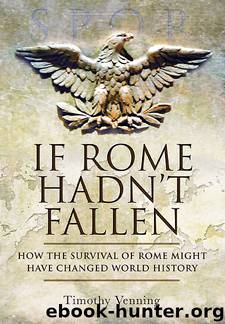If Rome Hadn't Fallen by Timothy Venning

Author:Timothy Venning
Language: eng
Format: epub, mobi
Tags: HISTORY / Ancient / General
Publisher: Pen and Sword
Published: 2011-05-09T16:00:00+00:00
Ireland
The Church in Rome had sponsored the civilising missions of Palladius and Patrick in the real-life mid-fifth century. If the Western Empire had continued, Rome’s interest in the project would have been greater (not least to discourage local raids on Britain and Gaul) given that the post-560s Papacy would not have been distracted by its local political role in Italy as it was in real life. The main centre of administrative expertise and organisation in the senate-less Rome of the restored Imperial Italy from the Gothic defeat in 553/4, it had an important local role backing up the civil government (which was based across the Appenines in Ravenna). The mixture of plague and devastating war had reduced the personnel available to man the administration of Italy, and from 568 the region was afflicted by a piecemeal penetration by bands of Lombards who were centred in the Po valley but by the 570s and 580s were spreading further south. The lack of a concerted invasion by a powerful Germanic army, as with the Goths in 402, 405, and 408, or of a permanent centralised Lombard war-leadership did not prevent the Lombards from serious disruption. Assorted local duchies were set up usually with autonomy from the emerging Lombard kingship based at Pavia by the Po; a major one was at Spoleto in Umbria, within striking-distance of Rome.
The estates of the remaining Roman nobility and the Papacy were being raided, thus diminishing their resources, and Rome itself was threatened by the time of the reign of Pope Pelagius II (579–90). The Lombards were a major preoccupation for Gregory the Great and his successors. A stable and peaceful Imperial government in Italy would have avoided this distraction and enabled the better-resourced Papacy to concentrate on useful missions like converting the Irish to aid the Empire’s foreign relations. Conversely, however, the political and military weakness of the Eastern Empire’s viceroys in Italy, the ‘Exarchs’, and the absence of the Senate meant that the Papacy had to assume local civil leadership in central Italy. Lacking this stimulus to its administrative development and initiation of its own foreign policy, the post-550s Popes would have been less powerful than Gregory and his ilk, and under closer Imperial control even if the Western Emperor still ruled from Milan.
The emerging Christian Church organisation across Ireland would have received more aid from Italy had the central Church authorities had more resources. Patrick is unlikely to have been the only (recorded) mainstay of the conversion-mission, and the Church in Britain or Gaul would have been directing his mission and supplying priests. It is also probable that local customs at variance with those of the Roman Church, the different form of the priestly tonsure and the divergence in the date of celebrating Easter, would have been slower to develop, if they had done so at all. In real life the Church in Ireland and its offshoots, including Aedan’s mission in post-634 Northumbria, was allowed to develop without a stream of instructions delivered by zealously conformist officials sent from Rome.
Download
This site does not store any files on its server. We only index and link to content provided by other sites. Please contact the content providers to delete copyright contents if any and email us, we'll remove relevant links or contents immediately.
| Africa | Americas |
| Arctic & Antarctica | Asia |
| Australia & Oceania | Europe |
| Middle East | Russia |
| United States | World |
| Ancient Civilizations | Military |
| Historical Study & Educational Resources |
Room 212 by Kate Stewart(5101)
The Crown by Robert Lacey(4796)
Endurance: Shackleton's Incredible Voyage by Alfred Lansing(4747)
The Iron Duke by The Iron Duke(4344)
The Rape of Nanking by Iris Chang(4193)
Joan of Arc by Mary Gordon(4088)
Killing England by Bill O'Reilly(3989)
Say Nothing by Patrick Radden Keefe(3972)
I'll Give You the Sun by Jandy Nelson(3424)
Shadow of Night by Deborah Harkness(3350)
Hitler's Monsters by Eric Kurlander(3324)
Mary, Queen of Scots, and the Murder of Lord Darnley by Alison Weir(3194)
Blood and Sand by Alex Von Tunzelmann(3186)
Eleanor & Park by Rainbow Rowell(3145)
Darkest Hour by Anthony McCarten(3115)
Margaret Thatcher: The Autobiography by Thatcher Margaret(3071)
Book of Life by Deborah Harkness(2919)
Red Famine: Stalin's War on Ukraine by Anne Applebaum(2914)
The One Memory of Flora Banks by Emily Barr(2851)
